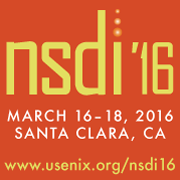HUG: Multi-Resource Fairness for Correlated and Elastic Demands
Mosharaf Chowdhury, University of Michigan; Zhenhua Liu, Stony Brook University; Ali Ghodsi and Ion Stoica, University of California, Berkeley, and Databricks Inc.
In this paper, we study how to optimally provide isolation guarantees in multi-resource environments, such as public clouds, where a tenant’s demands on different resources (links) are correlated. Unlike prior work such as Dominant Resource Fairness (DRF) that assumes static and fixed demands, we consider elastic demands. Our approach generalizes canonical max-min fairness to the multi-resource setting with correlated demands, and extends DRF to elastic demands. We consider two natural optimization objectives: isolation guarantee from a tenant’s viewpoint and system utilization (work conservation) from an operator’s perspective. We prove that in non-cooperative environments like public cloud networks, there is a strong tradeoff between optimal isolation guarantee and work conservation when demands are elastic. Even worse, work conservation can even decrease network utilization instead of improving it when demands are inelastic. We identify the root cause behind the tradeoff and present a provably optimal allocation algorithm, High Utilization with Guarantees (HUG), to achieve maximum attainable network utilization without sacrificing the optimal isolation guarantee, strategyproofness, and other useful properties of DRF. In cooperative environments like private datacenter networks, HUG achieves both the optimal isolation guarantee and work conservation. Analyses, simulations, and experiments show that HUG provides better isolation guarantees, higher system utilization, and better tenant-level performance than its counterparts.
Open Access Media
USENIX is committed to Open Access to the research presented at our events. Papers and proceedings are freely available to everyone once the event begins. Any video, audio, and/or slides that are posted after the event are also free and open to everyone. Support USENIX and our commitment to Open Access.
author = {Mosharaf Chowdhury and Zhenhua Liu and Ali Ghodsi and Ion Stoica},
title = {{HUG}: {Multi-Resource} Fairness for Correlated and Elastic Demands},
booktitle = {13th USENIX Symposium on Networked Systems Design and Implementation (NSDI 16)},
year = {2016},
isbn = {978-1-931971-29-4},
address = {Santa Clara, CA},
pages = {407--424},
url = {https://www.usenix.org/conference/nsdi16/technical-sessions/presentation/chowdhury},
publisher = {USENIX Association},
month = mar
}















connect with us